Unit 11 Rules Matter! Exploring the topic Grammar in Use(教学课件2)(共41张PPT)
文档属性
| 名称 | Unit 11 Rules Matter! Exploring the topic Grammar in Use(教学课件2)(共41张PPT) | 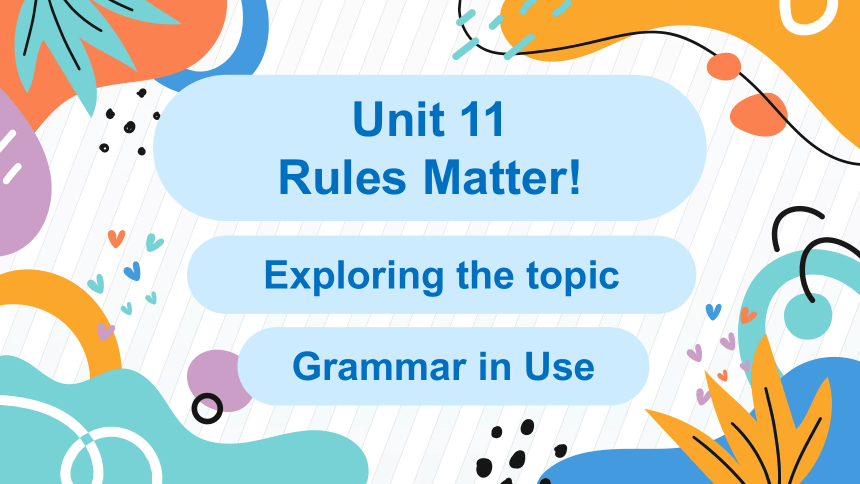 | |
| 格式 | pptx | ||
| 文件大小 | 11.4MB | ||
| 资源类型 | 教案 | ||
| 版本资源 | 仁爱科普版 | ||
| 科目 | 英语 | ||
| 更新时间 | 2025-06-13 19:01:47 | ||
图片预览

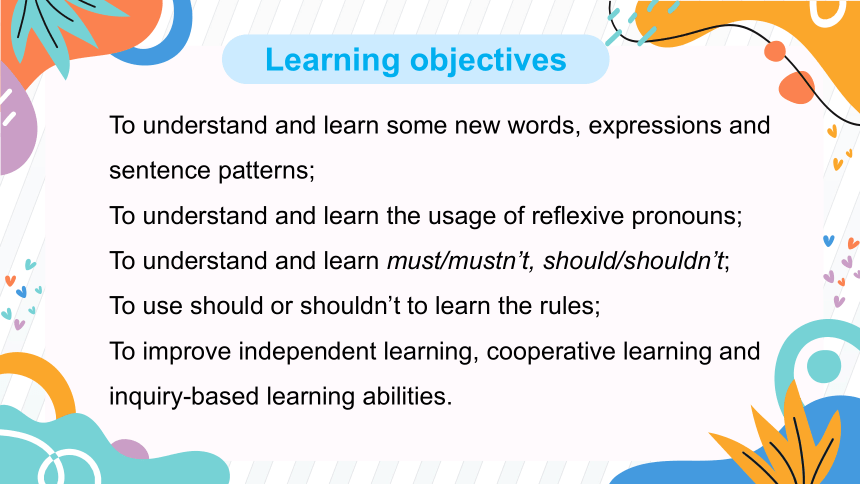
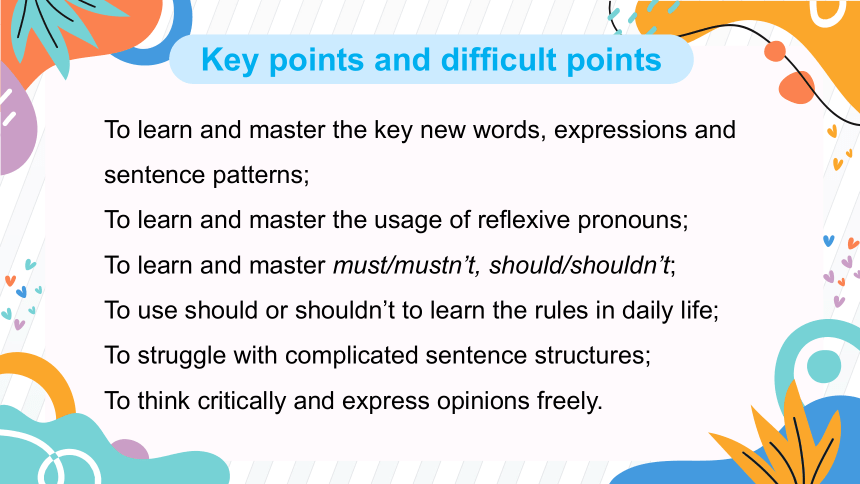
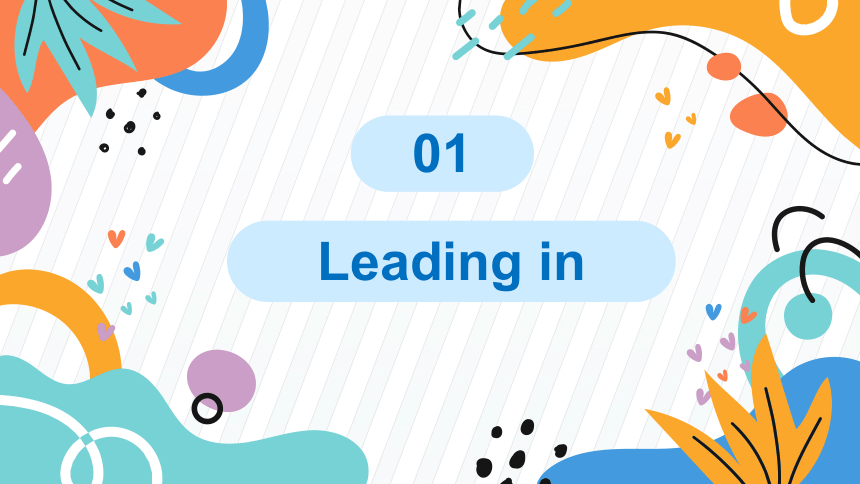
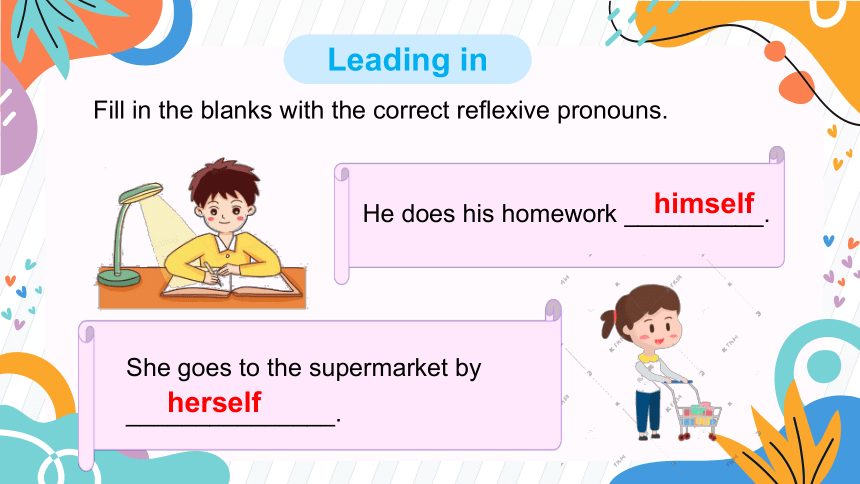
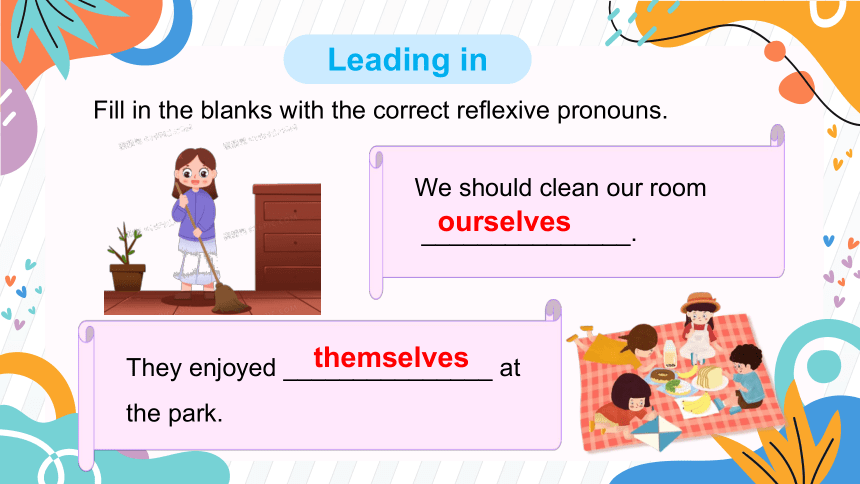
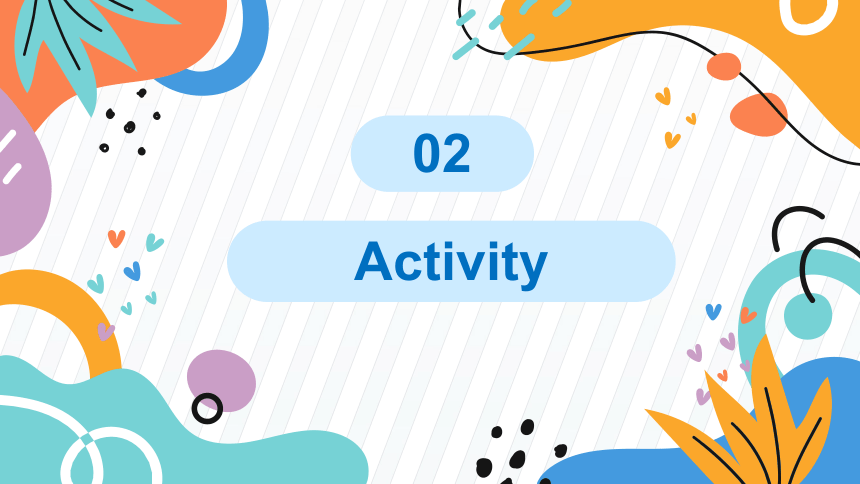
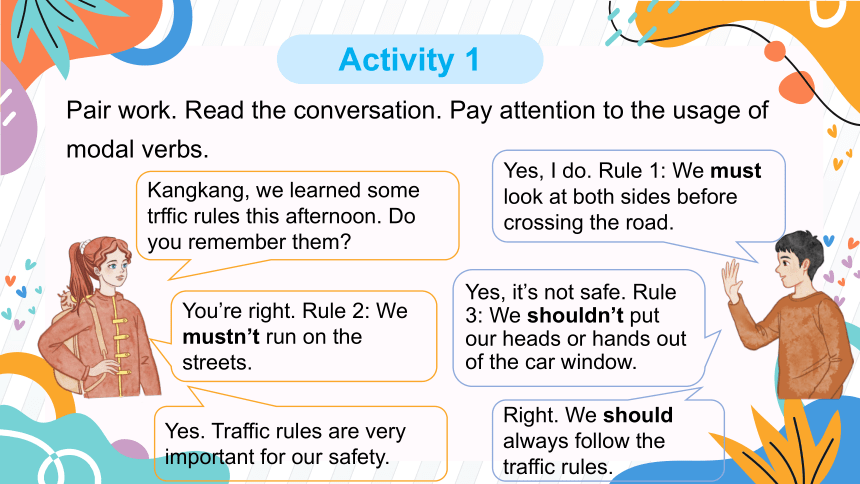
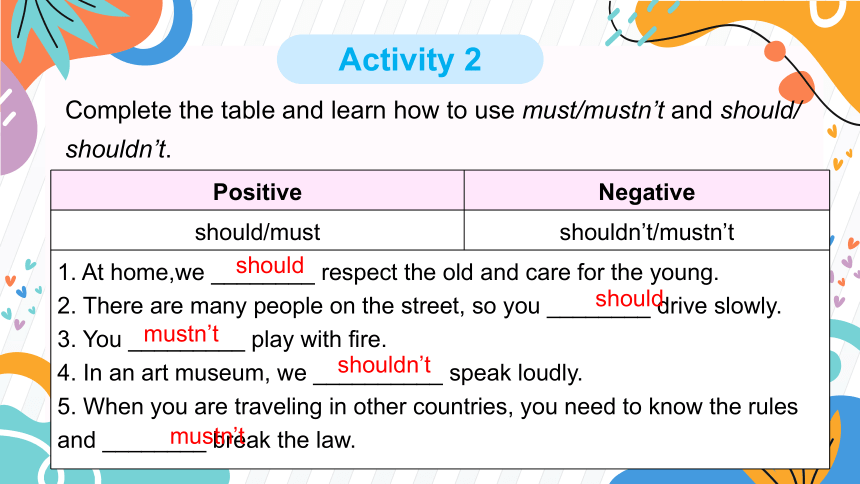
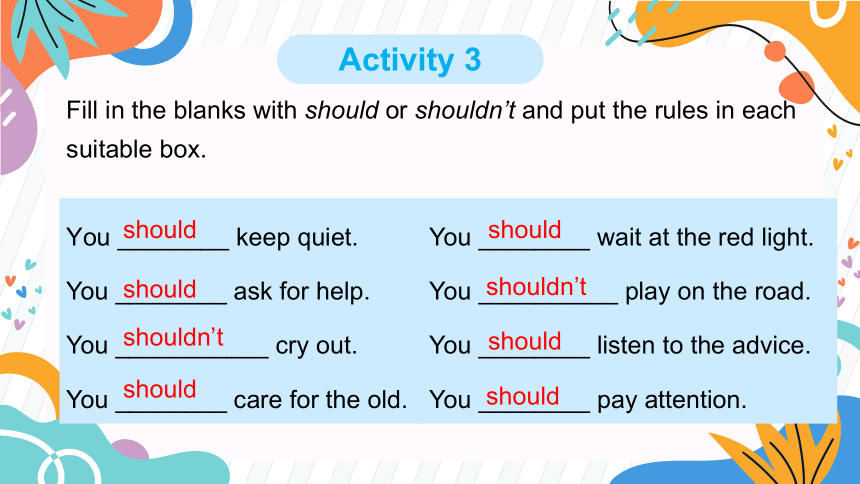
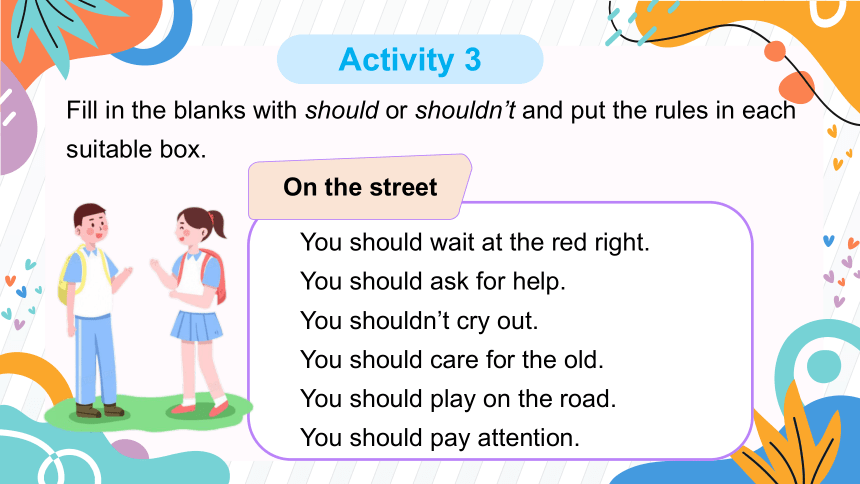
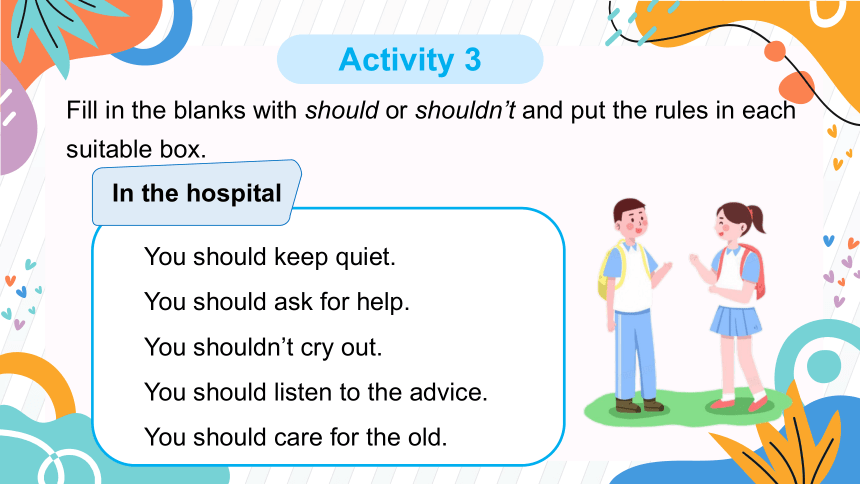
文档简介
(共41张PPT)
Exploring the topic
Grammar in Use
Unit 11
Rules Matter!
Learning objectives
To understand and learn some new words, expressions and sentence patterns;
To understand and learn the usage of reflexive pronouns;
To understand and learn must/mustn’t, should/shouldn’t;
To use should or shouldn’t to learn the rules;
To improve independent learning, cooperative learning and inquiry-based learning abilities.
Key points and difficult points
To learn and master the key new words, expressions and sentence patterns;
To learn and master the usage of reflexive pronouns;
To learn and master must/mustn’t, should/shouldn’t;
To use should or shouldn’t to learn the rules in daily life;
To struggle with complicated sentence structures;
To think critically and express opinions freely.
Leading in
01
Leading in
Fill in the blanks with the correct reflexive pronouns.
He does his homework __________.
She goes to the supermarket by _______________.
himself
herself
Leading in
Fill in the blanks with the correct reflexive pronouns.
We should clean our room
_______________.
They enjoyed _______________ at the park.
ourselves
themselves
Activity
02
Activity 1
Pair work. Read the conversation. Pay attention to the usage of modal verbs.
Kangkang, we learned some trffic rules this afternoon. Do you remember them
You’re right. Rule 2: We mustn’t run on the streets.
Yes. Traffic rules are very important for our safety.
Yes, I do. Rule 1: We must look at both sides before crossing the road.
Yes, it’s not safe. Rule 3: We shouldn’t put our heads or hands out of the car window.
Right. We should always follow the traffic rules.
Activity 2
Complete the table and learn how to use must/mustn’t and should/ shouldn’t.
Positive Negative
should/must shouldn’t/mustn’t
1. At home,we ________ respect the old and care for the young. 2. There are many people on the street, so you ________ drive slowly. 3. You _________ play with fire. 4. In an art museum, we __________ speak loudly. 5. When you are traveling in other countries, you need to know the rules and ________ break the law. should
should
mustn’t
shouldn’t
mustn’t
Activity 3
Fill in the blanks with should or shouldn’t and put the rules in each suitable box.
You ________ keep quiet.
You ________ ask for help.
You ___________ cry out.
You ________ care for the old.
You ________ wait at the red light.
You __________ play on the road.
You ________ listen to the advice.
You ________ pay attention.
should
should
shouldn’t
should
should
shouldn’t
should
should
Activity 3
You should wait at the red light.
You should ask for help.
You shouldn’t cry out.
You should care for old.
You shouldn’t play on the road.
You should pay attention
On the street
You should wait at the red right.
You should ask for help.
You shouldn’t cry out.
You should care for the old.
You should play on the road.
You should pay attention.
Fill in the blanks with should or shouldn’t and put the rules in each suitable box.
Activity 3
You should wait at the red light.
You should ask for help.
You shouldn’t cry out.
You should care for old.
You shouldn’t play on the road.
You should pay attention
In the hospital
You should keep quiet.
You should ask for help.
You shouldn’t cry out.
You should listen to the advice.
You should care for the old.
Fill in the blanks with should or shouldn’t and put the rules in each suitable box.
Grammar
03
Grammar
Grammar
情态动词:must,should
一、概念
情态动词通常用来表达说话人的情感态度或语气,主要包括猜测、判断、需要、可能、各种意愿等。有如下特点:
① 本身有一定的词义,但不能单独作谓只能和动词原形一起构成谓语
② 情态动词没有人称和数的变化
③ 在句子的位置:用在动词之前
Grammar
二、情态动词must
1. must 意为“必须,一定”,多指现在或将来的情况,表示说话人的主观看法
We must follow the traffic rules when we ride bikes.
骑车时我们必须遵守交通规则。
2. must 的否定式为 mustn’t,表示“禁止;一定不要;绝对不能”的意思,语气比较强烈
You mustn't play football on the road.
你千万不要在马路上踢球。
Grammar
二、情态动词must
3. 辨析 must 和 have to
① must,必须,表示说话人主观上的看法,即主观上的必要;must没有词形变化,只有一种形式
Wang Hong said she must work hard.
王红说她必须努力工作。
② have to,必须;不得不,表示客观的需要,不受主观
意志的影响;have to有人称时态和数的变化
It rained hard yesterday, so l had to stay at home for a whole day. 昨天雨下得很大,所以我不得不在家待了一整天。
Grammar
二、情态动词must
4. must 的其他用法
① must 表示推测,意为“一定是;肯定是”,一般用于肯定句
My mother must be very tired after a long day's work.
经过一天繁忙的工作,我妈妈一定非常累。
② must引导的一般疑问句,肯定回答用must;否定回答用needn't或是 don't have to,不能用 mustn't
- Must l finish the work today 我必须今天完成工作吗
- No, you needn't / don't have to. 不,你不用。
Grammar
二、情态动词must
5. 情态动词表猜测
① must 意为“一定”,一般用于肯定猜测
He must be very happy to see you.
见到你他一定很开心。
② can意为“可能”,常用于否定句或疑问句中
It can't be Kangkang's homework. l know his handwriting.
这不可能是康康的作业,我认识他的字迹。
Grammar
二、情态动词must
5. 情态动词表猜测
③ may意为“可能;也许”,常用于肯定句中
She may come here tomorrow, but I'm not sure.
她可能明天来这里,但我不确定。
④ might意为“可能;也许”。might是may的过去式;表推测时,可能性低于may
Li Ming might be at home this evening.
今晚李明可能在家。
Grammar
三、情态动词should
1. should,意为“应该;应当”,没有人称和数的变化,后跟动词原形。其否定式为shouldn't
We should come to school on time.
我们应该准时到校。
We shouldn't speak loudly in the library.
我们不应该在图书馆大声喧哗。
The treatment should be repeated every two to three hours.
这种治疗方法应该每隔两到三小时重复一次。
Grammar
三、情态动词should
2. should 的用法
① 表示征询意见或提出建议
We should eat fruit every day. 我们应该每天吃水果。
② 表示推测
She should do some washing. 她应该在洗衣服。
③ 表示义务或责任
As students, we should study hard.
作为学生,我们应该努力学习。
Grammar
三、情态动词should
2. should 的用法
④ 表示说话人的特殊情感,如惊奇、愤怒、失望等
Why should he do that
他为什么做出那种事
⑤ 表示做某事是正确的或明智的,往往表达说话者的观点
When walking on the streets, we should follow the traffic rules.
在街上行走的时候,我们应该遵守交通规则。
Vocabulary
04
Vocabulary
单词 词性 释义
head n. 头;负责人
v. 前往
slowly adv. 慢速地;缓慢地
speak v. 说话;谈话
loudly adv. 吵闹地;嘈杂地
Iaw n. 法律;法规
advice n. 劝告;建议
attention n. 注意;专心
Language points
05
Language points
1. In an art museum, we shouldn't speak loudly.
speak(1)不及物动词,意为“说话;谈话;演讲;发言”
Wang Li wants to speak at the meeting.
王莉想在会议上发言。
May I speak to Kangkang, please
我可以找一下康康吗 (常用于电话用语中)
(2)speak还可作及物动词,意为“说(某种语言)”
- Do you want to speak English well
你想说好英语吗
- Yes, I do. 是的,我想。
Language points
1. In an art museum, we shouldn't speak loudly.
(3)辨析 speak,say,talk 和 tell
① speak及物动词,说某种语言;
不及物动词,说话;演讲
Kangkang can speak English and French.
康康会讲英语和法语。
② say 及物动词,说(强调说的内容)
Can you say it to me carefully
你能仔细跟我说说这件事吗
Language points
1. In an art museum, we shouldn't speak loudly.
(3)辨析 speak,say,talk 和 tell
③ talk 不及物动词,说话;和某人交谈
My mom often talks with my aunt on the phone.
我妈妈经常跟我姑姑在电话上聊天。
④ tell 及物动词,讲述;告诉(侧重指已方告知另一方)
My grandpa often tells stories to my sister and me.
爷爷经常给我和妹妹讲故事。
Language points
2. You should listen to the advice.
(1)advice,不可数名词,意为“劝告;忠告;建议;意见”,表示数量时,常借助于piece 或 some 等词
We must follow the doctors’ advice if we are ill.
生病时我们要听从医生的建议。
Could you give me some advice about learning English
你能给我一些关于学习英语的建议吗
Language points
2. You should listen to the advice.
(2)辨析advice与suggestion
① advice,不可数名词,表示“一条建议/忠告”时,要用“a piece of advice”
Let me give you a piece of advice.
让我给你一个忠告。
② suggestion 可数名词,复数形式为 suggestions
Here are some of our suggestions.
这是我们的一些建议。
Language points
2. You should listen to the advice.
(3) advise是advice 的动词形式,意为“建议;劝告”
advise sb. (not) to do sth. 意为“建议某人(不要)做某事”
My father advises me to go for a walk with him after dinner.
我爸爸建议我晚饭后跟他一起去散步。
I advise you not to buy shoes in that shop.
我劝你不要去那家商店买鞋。
Language points
3. You should pay attention.
(1)attention,名词,意为“注意;专心”
He turned his attention back to the road again.
他把注意力转回到道路上。
(2)pay attention to 意为“注意,留心”,其中 to是介词,后可跟名词、代词、动名词或从句
You should pay attention to taking care of your kids in public.
在公共场所,你要注意照看好自己的孩子。
Exercise
06
Exercise
1. 你要多注意你的单词拼写。
You should pay more ________________ to your spelling.
2. 学会说好一种语言需要花很长的时间。
It takes a long time to learn to __________ a language well.
3. 他听从医生的劝告戒烟了。
He took the doctor's ______________ to give up smoking.
4. 能不能请您就我该做什么给点建议呢?
Please could you ______________ me what I should do
attention
speak
advice
advise
Exercise
5. We _____________ give our seats to old people when we are on a bus. (should/shouldn’t)
6. We _____________ laugh at others. (should/shouldn’t)
7. They _____________ be hungry after such a long walk. (must/mustn’t)
8. The children _____________ play in the street. (must/mustn’t)
should
shouldn’t
must
mustn’t
Summary
07
Summary
Learn and master some new words, expressions and sentence patterns;
Understand and learn the usage of reflexive pronouns;
Understand and learn must/mustn’t, should/shouldn’t;
Use should or shouldn’t to learn the rules in daily life;
Analyze and learn complicated sentence structures;
Think critically and express opinions freely.
Homework
08
Homework
Must-do: Review the key words, expressions, sentence patterns and grammar in today’s lesson.
Choose-to-do: Make a conversation with must/mustn’t, should/shouldn’t.
Thank you
Exploring the topic
Grammar in Use
Unit 11
Rules Matter!
Learning objectives
To understand and learn some new words, expressions and sentence patterns;
To understand and learn the usage of reflexive pronouns;
To understand and learn must/mustn’t, should/shouldn’t;
To use should or shouldn’t to learn the rules;
To improve independent learning, cooperative learning and inquiry-based learning abilities.
Key points and difficult points
To learn and master the key new words, expressions and sentence patterns;
To learn and master the usage of reflexive pronouns;
To learn and master must/mustn’t, should/shouldn’t;
To use should or shouldn’t to learn the rules in daily life;
To struggle with complicated sentence structures;
To think critically and express opinions freely.
Leading in
01
Leading in
Fill in the blanks with the correct reflexive pronouns.
He does his homework __________.
She goes to the supermarket by _______________.
himself
herself
Leading in
Fill in the blanks with the correct reflexive pronouns.
We should clean our room
_______________.
They enjoyed _______________ at the park.
ourselves
themselves
Activity
02
Activity 1
Pair work. Read the conversation. Pay attention to the usage of modal verbs.
Kangkang, we learned some trffic rules this afternoon. Do you remember them
You’re right. Rule 2: We mustn’t run on the streets.
Yes. Traffic rules are very important for our safety.
Yes, I do. Rule 1: We must look at both sides before crossing the road.
Yes, it’s not safe. Rule 3: We shouldn’t put our heads or hands out of the car window.
Right. We should always follow the traffic rules.
Activity 2
Complete the table and learn how to use must/mustn’t and should/ shouldn’t.
Positive Negative
should/must shouldn’t/mustn’t
1. At home,we ________ respect the old and care for the young. 2. There are many people on the street, so you ________ drive slowly. 3. You _________ play with fire. 4. In an art museum, we __________ speak loudly. 5. When you are traveling in other countries, you need to know the rules and ________ break the law. should
should
mustn’t
shouldn’t
mustn’t
Activity 3
Fill in the blanks with should or shouldn’t and put the rules in each suitable box.
You ________ keep quiet.
You ________ ask for help.
You ___________ cry out.
You ________ care for the old.
You ________ wait at the red light.
You __________ play on the road.
You ________ listen to the advice.
You ________ pay attention.
should
should
shouldn’t
should
should
shouldn’t
should
should
Activity 3
You should wait at the red light.
You should ask for help.
You shouldn’t cry out.
You should care for old.
You shouldn’t play on the road.
You should pay attention
On the street
You should wait at the red right.
You should ask for help.
You shouldn’t cry out.
You should care for the old.
You should play on the road.
You should pay attention.
Fill in the blanks with should or shouldn’t and put the rules in each suitable box.
Activity 3
You should wait at the red light.
You should ask for help.
You shouldn’t cry out.
You should care for old.
You shouldn’t play on the road.
You should pay attention
In the hospital
You should keep quiet.
You should ask for help.
You shouldn’t cry out.
You should listen to the advice.
You should care for the old.
Fill in the blanks with should or shouldn’t and put the rules in each suitable box.
Grammar
03
Grammar
Grammar
情态动词:must,should
一、概念
情态动词通常用来表达说话人的情感态度或语气,主要包括猜测、判断、需要、可能、各种意愿等。有如下特点:
① 本身有一定的词义,但不能单独作谓只能和动词原形一起构成谓语
② 情态动词没有人称和数的变化
③ 在句子的位置:用在动词之前
Grammar
二、情态动词must
1. must 意为“必须,一定”,多指现在或将来的情况,表示说话人的主观看法
We must follow the traffic rules when we ride bikes.
骑车时我们必须遵守交通规则。
2. must 的否定式为 mustn’t,表示“禁止;一定不要;绝对不能”的意思,语气比较强烈
You mustn't play football on the road.
你千万不要在马路上踢球。
Grammar
二、情态动词must
3. 辨析 must 和 have to
① must,必须,表示说话人主观上的看法,即主观上的必要;must没有词形变化,只有一种形式
Wang Hong said she must work hard.
王红说她必须努力工作。
② have to,必须;不得不,表示客观的需要,不受主观
意志的影响;have to有人称时态和数的变化
It rained hard yesterday, so l had to stay at home for a whole day. 昨天雨下得很大,所以我不得不在家待了一整天。
Grammar
二、情态动词must
4. must 的其他用法
① must 表示推测,意为“一定是;肯定是”,一般用于肯定句
My mother must be very tired after a long day's work.
经过一天繁忙的工作,我妈妈一定非常累。
② must引导的一般疑问句,肯定回答用must;否定回答用needn't或是 don't have to,不能用 mustn't
- Must l finish the work today 我必须今天完成工作吗
- No, you needn't / don't have to. 不,你不用。
Grammar
二、情态动词must
5. 情态动词表猜测
① must 意为“一定”,一般用于肯定猜测
He must be very happy to see you.
见到你他一定很开心。
② can意为“可能”,常用于否定句或疑问句中
It can't be Kangkang's homework. l know his handwriting.
这不可能是康康的作业,我认识他的字迹。
Grammar
二、情态动词must
5. 情态动词表猜测
③ may意为“可能;也许”,常用于肯定句中
She may come here tomorrow, but I'm not sure.
她可能明天来这里,但我不确定。
④ might意为“可能;也许”。might是may的过去式;表推测时,可能性低于may
Li Ming might be at home this evening.
今晚李明可能在家。
Grammar
三、情态动词should
1. should,意为“应该;应当”,没有人称和数的变化,后跟动词原形。其否定式为shouldn't
We should come to school on time.
我们应该准时到校。
We shouldn't speak loudly in the library.
我们不应该在图书馆大声喧哗。
The treatment should be repeated every two to three hours.
这种治疗方法应该每隔两到三小时重复一次。
Grammar
三、情态动词should
2. should 的用法
① 表示征询意见或提出建议
We should eat fruit every day. 我们应该每天吃水果。
② 表示推测
She should do some washing. 她应该在洗衣服。
③ 表示义务或责任
As students, we should study hard.
作为学生,我们应该努力学习。
Grammar
三、情态动词should
2. should 的用法
④ 表示说话人的特殊情感,如惊奇、愤怒、失望等
Why should he do that
他为什么做出那种事
⑤ 表示做某事是正确的或明智的,往往表达说话者的观点
When walking on the streets, we should follow the traffic rules.
在街上行走的时候,我们应该遵守交通规则。
Vocabulary
04
Vocabulary
单词 词性 释义
head n. 头;负责人
v. 前往
slowly adv. 慢速地;缓慢地
speak v. 说话;谈话
loudly adv. 吵闹地;嘈杂地
Iaw n. 法律;法规
advice n. 劝告;建议
attention n. 注意;专心
Language points
05
Language points
1. In an art museum, we shouldn't speak loudly.
speak(1)不及物动词,意为“说话;谈话;演讲;发言”
Wang Li wants to speak at the meeting.
王莉想在会议上发言。
May I speak to Kangkang, please
我可以找一下康康吗 (常用于电话用语中)
(2)speak还可作及物动词,意为“说(某种语言)”
- Do you want to speak English well
你想说好英语吗
- Yes, I do. 是的,我想。
Language points
1. In an art museum, we shouldn't speak loudly.
(3)辨析 speak,say,talk 和 tell
① speak及物动词,说某种语言;
不及物动词,说话;演讲
Kangkang can speak English and French.
康康会讲英语和法语。
② say 及物动词,说(强调说的内容)
Can you say it to me carefully
你能仔细跟我说说这件事吗
Language points
1. In an art museum, we shouldn't speak loudly.
(3)辨析 speak,say,talk 和 tell
③ talk 不及物动词,说话;和某人交谈
My mom often talks with my aunt on the phone.
我妈妈经常跟我姑姑在电话上聊天。
④ tell 及物动词,讲述;告诉(侧重指已方告知另一方)
My grandpa often tells stories to my sister and me.
爷爷经常给我和妹妹讲故事。
Language points
2. You should listen to the advice.
(1)advice,不可数名词,意为“劝告;忠告;建议;意见”,表示数量时,常借助于piece 或 some 等词
We must follow the doctors’ advice if we are ill.
生病时我们要听从医生的建议。
Could you give me some advice about learning English
你能给我一些关于学习英语的建议吗
Language points
2. You should listen to the advice.
(2)辨析advice与suggestion
① advice,不可数名词,表示“一条建议/忠告”时,要用“a piece of advice”
Let me give you a piece of advice.
让我给你一个忠告。
② suggestion 可数名词,复数形式为 suggestions
Here are some of our suggestions.
这是我们的一些建议。
Language points
2. You should listen to the advice.
(3) advise是advice 的动词形式,意为“建议;劝告”
advise sb. (not) to do sth. 意为“建议某人(不要)做某事”
My father advises me to go for a walk with him after dinner.
我爸爸建议我晚饭后跟他一起去散步。
I advise you not to buy shoes in that shop.
我劝你不要去那家商店买鞋。
Language points
3. You should pay attention.
(1)attention,名词,意为“注意;专心”
He turned his attention back to the road again.
他把注意力转回到道路上。
(2)pay attention to 意为“注意,留心”,其中 to是介词,后可跟名词、代词、动名词或从句
You should pay attention to taking care of your kids in public.
在公共场所,你要注意照看好自己的孩子。
Exercise
06
Exercise
1. 你要多注意你的单词拼写。
You should pay more ________________ to your spelling.
2. 学会说好一种语言需要花很长的时间。
It takes a long time to learn to __________ a language well.
3. 他听从医生的劝告戒烟了。
He took the doctor's ______________ to give up smoking.
4. 能不能请您就我该做什么给点建议呢?
Please could you ______________ me what I should do
attention
speak
advice
advise
Exercise
5. We _____________ give our seats to old people when we are on a bus. (should/shouldn’t)
6. We _____________ laugh at others. (should/shouldn’t)
7. They _____________ be hungry after such a long walk. (must/mustn’t)
8. The children _____________ play in the street. (must/mustn’t)
should
shouldn’t
must
mustn’t
Summary
07
Summary
Learn and master some new words, expressions and sentence patterns;
Understand and learn the usage of reflexive pronouns;
Understand and learn must/mustn’t, should/shouldn’t;
Use should or shouldn’t to learn the rules in daily life;
Analyze and learn complicated sentence structures;
Think critically and express opinions freely.
Homework
08
Homework
Must-do: Review the key words, expressions, sentence patterns and grammar in today’s lesson.
Choose-to-do: Make a conversation with must/mustn’t, should/shouldn’t.
Thank you
同课章节目录
